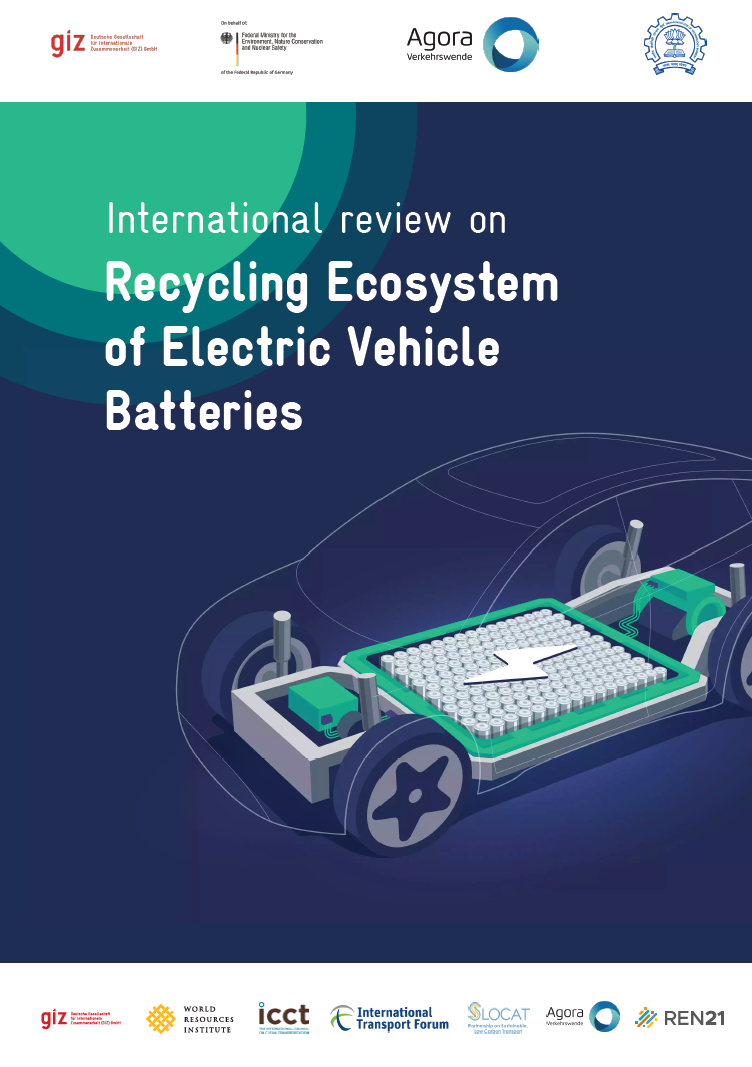Reports

International Review on Recycling Ecosystem of Electric Vehicle Batteries
2022
Author(s): Bej S (GIZ), Zhimomi T (GIZ), Hochfeld C (Agora Verkehrswende), Riehle EB (Agora Verkehrswende), Rather Z (Indian Institute of Technology Bombay), Bradiya MR (Indian Institute of Technology Bombay), Maity S (Indian Institute of Technology Bombay)
This study focuses on the recycling ecosystem of batteries. Batteries up until recently were primarily used in electronic appliances. However, with the advent of EVs, batteries for traction applications have become synonymous with battery recycling and needs careful and in-depth study.
Diving ambitions: the business case for circular economy in the car industry
2022
Author(s): Dror M B, Gupta A, Deloison T, Schmidt A, Holst A, Machur W, Lacy P, Reers J
The circular economy approach enables automotive companies to increase revenues per vehicle by 15-20 times the sales price and significantly improve profitability by maximizing lifetime performance.
A dataset of electric school bus adoption in the United States
2022
Author(s): Lazer L, Freehafer L
This technical note describes the methods used to create a dataset that tracks electric school bus (ESB) adoption across the United States. The dataset tracks the number of “committed” ESBs at the school district level, as well as details about individual buses, including bus manufacturer and funding source(s). It also contains school district socio-economic characteristics like poverty rates and racial composition, to enable wider analysis including whether the transition to ESBs is happening equitably.
Decarbonizing China’s road transport sector: strategies toward carbon neutrality
2022
Author(s): Xue L, Liu D
Within the transport sector, road transport represented the largest share 84.1 percent of transport related GHG emissions in China in 2014 (MEE 2020a). To meet its carbon neutrality goal, China’s road transport sector needs explicit sectoral emission reduction targets, actionable strategies, and cost-effective policy instruments. This study examines how the transport sector might be decarbonized in China.
Pathways to electric mobility in the Sahel: two and three-wheelers in Bamako and Ouagadougou
2021
Author(s): Fatima A, Vincent V
Lessons from Chile’s experience with e-mobility: the integration of e-buses in Santiago
2020
Author(s): World Bank
This report aims to increase awareness of effective ways to reduce emissions in the transport sector by outlining the planning, implementation, and management of electric buses (e-buses) in the fleet of Santiago’s public transport system
Sustainable transport solutions low-carbon buses in the people’s Republic of China
2018
Author(s): Asian Development Bank
This report discusses the real-world performance data of low-carbon buses in the People’s Republic of China.
Vision 2050: aligning aviation with the Paris agreement
2022
Author(s): Graver B, Zheng S, Rutherford D, Mukhodpadhaya J, Pronk E
The report outlines a roadmap that is global in scope, while including only international operations. It describes the effect of fuel price on traffic demand. It compares cumulative CO2 emissions from three scenarios against global carbon budgets that are tied to the three temperature targets. And it suggests intermediate goals to ensure that the aviation sector makes early investments in new emissions-reduction technology to avoid quickly consuming its share of the global carbon budget.
The report observed much of the growth in electrification can be attributed to targets and policy support for electric vehicles, in addition to the rising economic competitiveness, technological advancement and model availability of these vehicles. In 2021, electric car sales totalled 6.6 million worldwide, more than doubling from 2020, while sales of other electric vehicles such as two- and three wheelers and buses also saw significant increases.
Electrifying last-mile delivery: a total cost of ownership comparison of battery-electric and diesel trucks in Europe
2022
Author(s): Hussein Basma H, Rodríguez F, Hildermeier J, Jahn A
The study finds that battery-electric trucks for last-mile delivery can reach TCO parity with their diesel counterparts today in most of the European cities considered in this study with the purchase premiums currently available.



